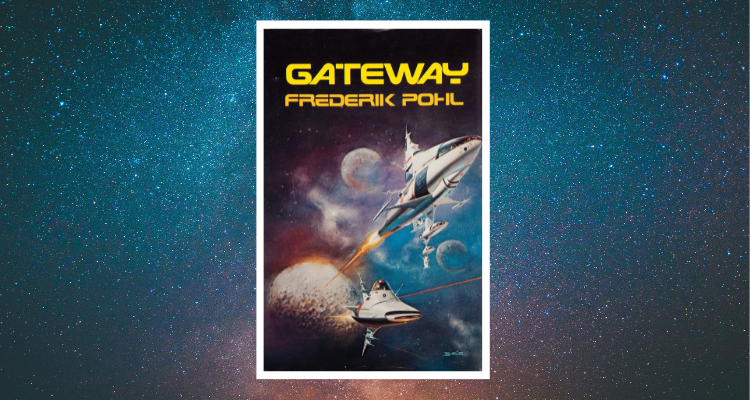|
Frederik Pohl (1919 - 2013) had an incredibly long career in science fiction. He wrote, edited and worked as an agent for over 70 years, from the early 1940s right through to the end of his long life. Gateway is a key work in the second wave of his writing career, which began in 1969 after a long spell helping others to get their stories published. Originally serialised in Galaxy magazine, Gateway was a major success which won both the Locus and Nebula Awards for best novel, and the John W. Campbell award.
Robinette Broadhead lives on a bleak, desperately overpopulated future Earth. Working in the grim “food mines” of Wyoming, he longs for a break and finally gets one - a lottery win. With his prize, Broadhead buys himself a trip to “Gateway”, a hollowed-out asteroid found concealed within our solar system. Once used by the mysterious, vanished alien Heechee, this rocky enigma contains a thousand of their highly advanced starships. Gateway is the centre of a “star rush”, humanity’s chance to explore and exploit the galaxy. Broadhead hopes to strike it lucky, to crew a Heechee ship that might discover alien relics. Success could mean fame, fortune, and a life of luxury. The starships, though, are as inscrutable as they are powerful. Broadhead learns that the vessels are easy to pilot, but impossible to control. Any trip out is not only long, cramped and squalid but could see its crew come back empty handed - if they make it back at all.
With Gateway, Frederik Pohl came up with a useful solution to the problem that faster-than-light travel presents to science fiction writers. In the novel, humans have no need to develop this technology - it just lands in mankind’s lap, courtesy of the disappeared Heechee. What Pohl crafts is anything but easy wish fulfilment, however. Gateway itself is a mostly miserable environment, little better than the exhausted Earth that prospectors have left behind. Heechee ships are barely fit for human habitation and while they are extraordinarily fast, their pre-programmed journeys can take months or even years. At times, crews have starved to death before even glimpsing their destination.
The story suggests that huge technological leaps can do very little to improve humanity’s lot. In this future, faster-than-light travel is at the touch of a button but rapacious capitalism survives intact. Gateway is dominated by a monolithic corporation, which has desperate prospectors gamble with their lives for a slim chance at a big payday. The corporation jealously guards its control over Heechee tech, but places almost no value on workers’ lives. After all, a ship is irreplaceable but for every dead prospector, many more stand ready to take her place. The novel alternates between two types of chapters. The longer chapters recount Broadhead’s experiences on Gateway, and his trips into space. The shorter ones are set on Earth years later, covering discussions between the protagonist and his artificially intelligent psychiatrist. It becomes clear that Broadhead hit paydirt during his time on Gateway and became vastly wealthy as a result. However, he is wracked with guilt and neuroses about his relationships with others, particularly the women he met on the asteroid. Pohl suggests that wealth and luxury cannot make a person truly happy, and this too reflects the left-wing politics for which the author was well known. Gateway also includes an unusual emphasis on sexual relationships for an SF novel. This material is hardly intended to arouse - instead, it is a reflection of the trying conditions the characters endure, and their sadly flawed attempts at happiness. Throughout the book, Pohl includes numerous documents - journal entries, mission reports, classifieds, fragments of machine code, advertisements, and academic conjecture about the Heechee. In all, these make up something like 15% of the novel and work beautifully to flesh out its world. The mission reports are particularly gripping - in just a couple of hundred words, Pohl captures the vast risk of operating out of Gateway, and the miserable deaths that await the crew of a mission gone wrong. It is no wonder Broadhead finds himself paralysed by fearful trepidation. The idea of a world so driven by cruel exploitation and uncertainty is enough to send anyone running to a robot shrink.
0 Comments
Your comment will be posted after it is approved.
Leave a Reply. |
About
Exploring classic science fiction, with a focus on the 1950s to the 1990s. Also contributing to Entertainium, where I regularly review new games. Categories
All
|

